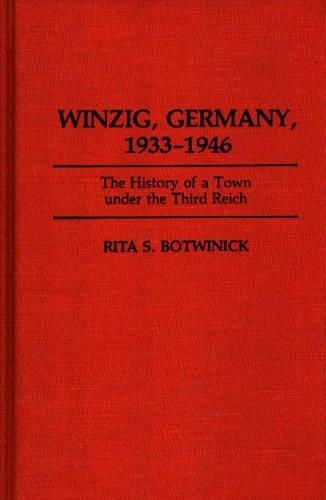
Winzig, Germany, 1933-1946: The History of a Town under the Third Reich
(Hardback)
Publishing Details
Winzig, Germany, 1933-1946: The History of a Town under the Third Reich
By (Author) Rita S. Botwinick
Bloomsbury Publishing PLC
Praeger Publishers Inc
24th August 1992
United States
Classifications
Tertiary Education
Non Fiction
European history
Second World War
Modern warfare
Far-right political ideologies and movements
943.086
Physical Properties
Hardback
176
Description
This history of Winzig challenges the view that Germany under Hitler resembled one vast concentration camp. Except for the Jews, the townspeople lived much as they had before 1933. A few Winzigers profited and a few suffered as a result of the Nazi regime, while most continued their non-political daily lives. Only World War II itself effected serious changes. Winzig was a microcosm of Germany in that only a minority supported Hitler, and yet in 12 years no strong anti-Nazi movement developed. That fact constitutes an indictment against silent majorities everywhere. Rita S. Botwinick's account of a small town examines how the Nazis achieved political power, the changes instituted by the New Order, the reaction and decimation of the town's Jewish families, the impact of the Russian invasion, and the expulsion of the German population by the Polish authorities. Botwinick discusses the integration of this expelled population into Germany west of the 1949 Polish/German border without the creation of long-term problems - a remarkable achievement which has been neglected in chronicles of the postwar era. The story of Winzig is told through narratives of the lives of ordinary individuals and describes their behaviour in the face of extraordinary circumstances.
Author Bio
RITA S. BOTWINICK is on the faculty of Florida Atlantic University, where she teaches European history and the Holocaust. Dr. Botwinick, who holds a Ph.D. from St. John's University, was born in Winzig, Germany and lived there until the age of sixteen, when she and some members of her family escaped to the United States. After World War II, contacts with former Winzigers were renewed--as a result she was able to personally document the events that occurred in Winzig in the 1940s.
